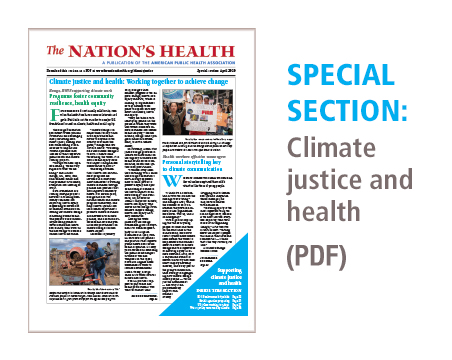Special section: Climate justice and health: Working together to achieve change
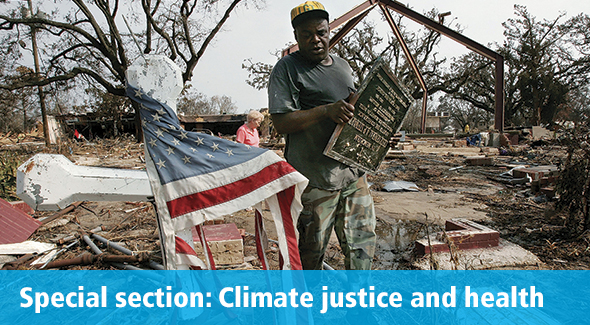
Download a PDF of the special section now!

Read and share articles on climate justice and health
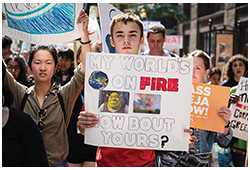
BRACE helping health agencies prepare for climate change effects: CDC framework supports resilience
As scientific evidence mounts showing the impact of climate change on human health, U.S. public health agencies are stepping up to develop programs to reduce and prevent risks.
To aid them, the Centers for Disease Control and Prevention created the Building Resilience Against Climate Effects framework. BRACE helps health leaders pinpoint and even predict how climate change will affect their respective regions, then formulate a plan to protect residents, especially people who are most vulnerable.
Personal storytelling key to climate communication: Health workers effective messengers
As climate change becomes more urgent, finding effective methods for talking about it in ways that resonate, engage and motivate people to action has become increasingly important. As communities around the world face new extremes in temperature, weather and disasters, the impacts make it easier to personalize climate stories.
Climate change threatens mental health of vulnerable communities
More than two-thirds of U.S. adults say they have some anxiety about climate change, while nearly half of young adults say stress about the global phenomenon impacts their daily lives.
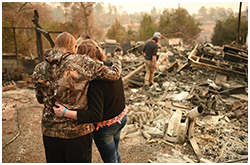 Sharing knowledge at nexus of climate change, social justice: Special section explores pressing issues
Sharing knowledge at nexus of climate change, social justice: Special section explores pressing issues
Climate justice means different things to different people. It affects us where we live, work, worship and play. This makes it very personal and emotional.
Programs foster community resilience, health equity: Kresge, RWJF supporting climate work
Foundations do not usually collaborate, even when the institutions have common interests and goals. But that is not the case for two major U.S. foundations focused on climate, health and social equity. The Kresge Foundation and Robert Wood Johnson Foundation are exchanging ideas, reviewing each other’s plans, sharing staff and collaborating at conferences to help ensure smooth operations and success of their respective public health and climate funding projects.
ECO Bookworms club helps adults talk to kids about climate change
Educating and inspiring children on climate change is one of the goals of APHA’s new Early Climate Optimists Bookworms club. Launched in February by APHA’s Center for Climate, Health and Equity, ECO Bookworms is geared toward readers ages 8 and younger.
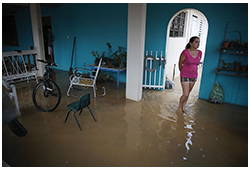 Q&A: Health inequities, social determinants exacerbated by climate change
Q&A: Health inequities, social determinants exacerbated by climate change
Adrienne Hollis of the Union of Concerned Scientists discusses how communities of color are often on the front lines of the impacts of climate change.
Water quality, availability made worse by climate change in US: Access to water linked to health equity
Protecting the nation’s drinking water is already a daunting task, and climate change is expected to make it even harder.
Public health needs to play crucial role in energy justice
Energy justice is a public health issue, which is why APHA is working to elevate public health and health equity in discussions to create a cleaner energy economy. By pursuing energy justice as a priority, public health professionals can play a role in both challenging health inequities and mitigating climate change.



